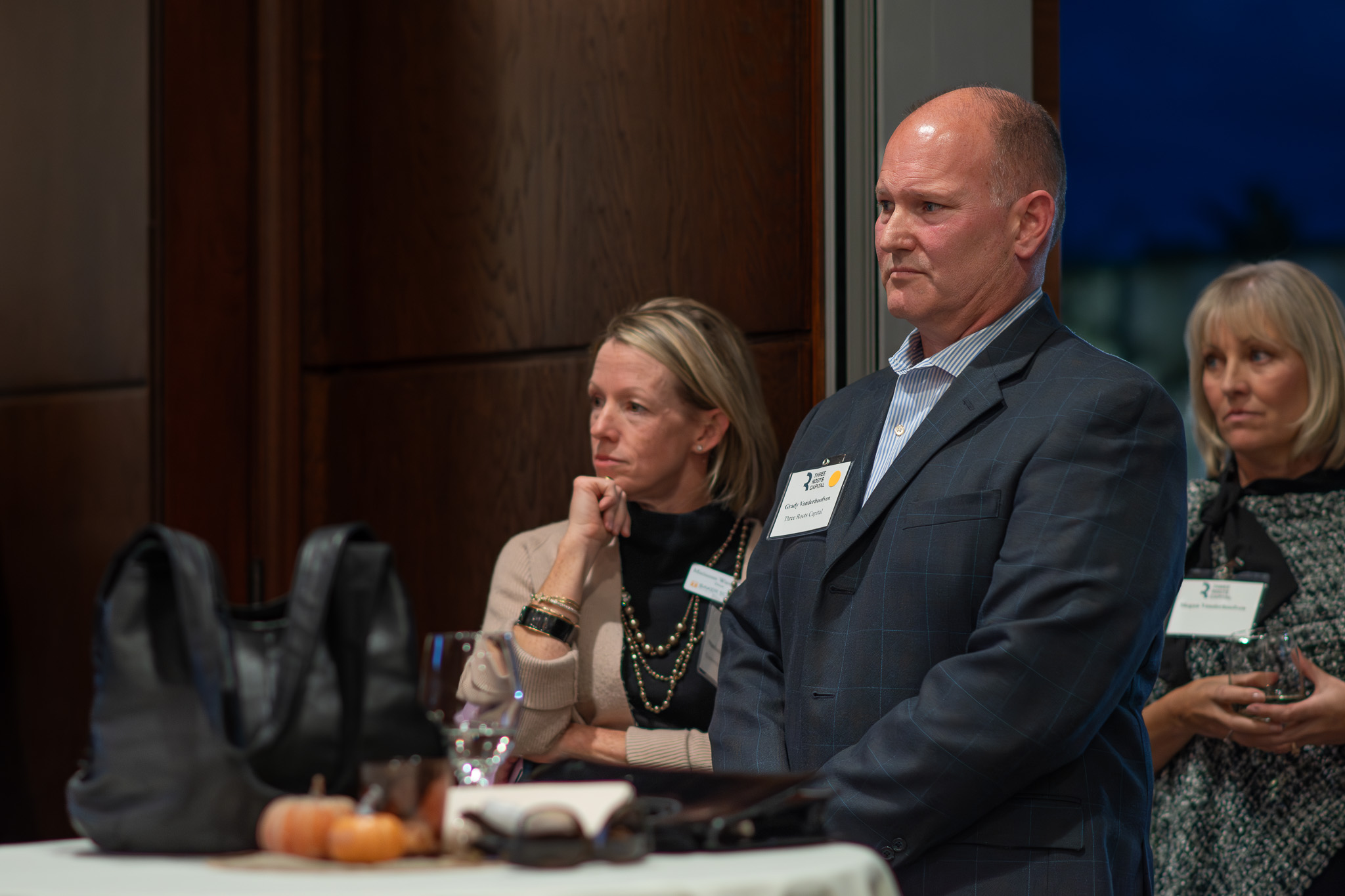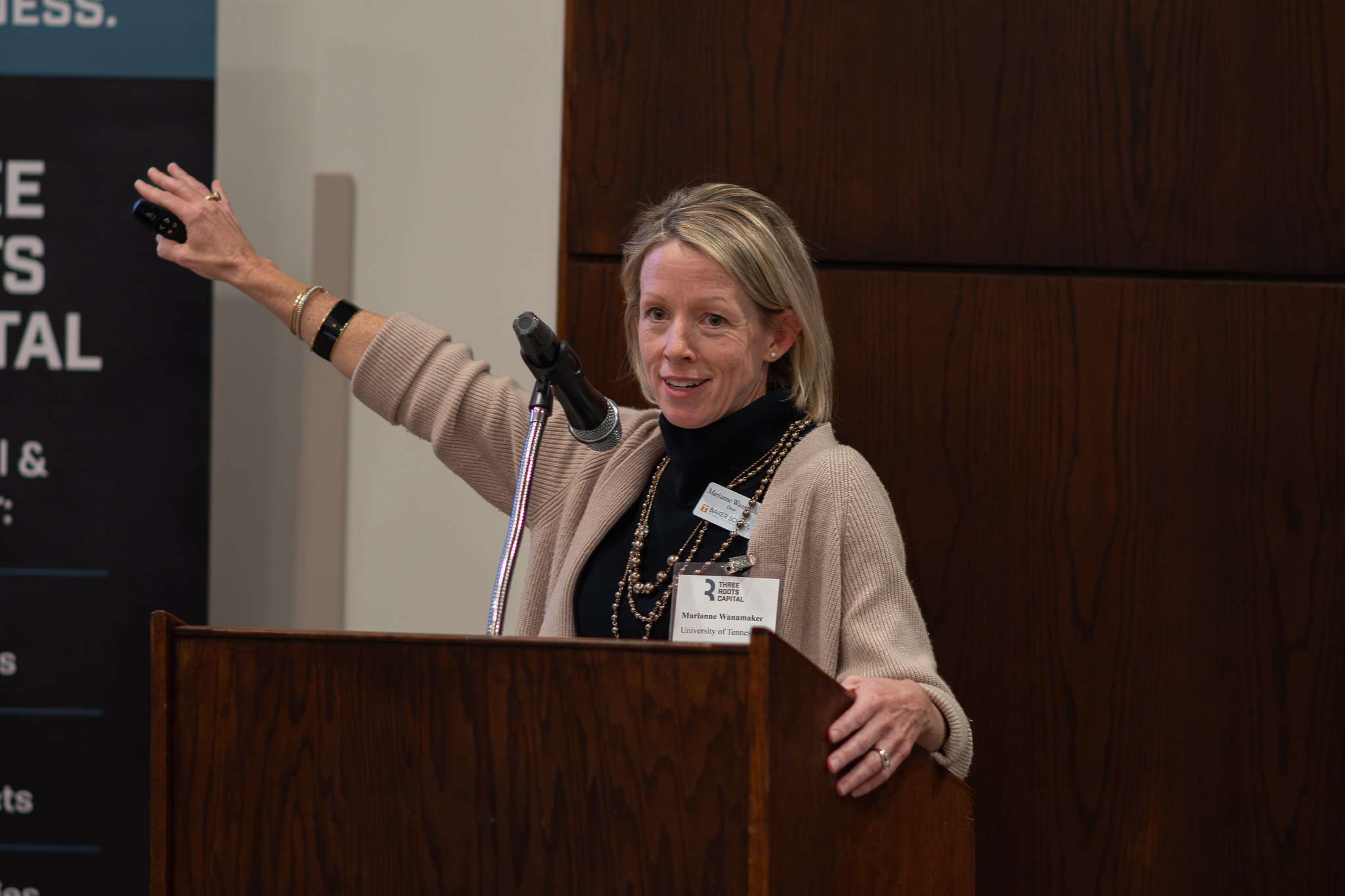
By Dr. Marianne Wanamaker, Dean, Baker School of Public Policy and Public Affairs, and Board Member, Three Roots Capital
I’ve enjoyed sitting on the Board of Directors for Three Roots Capital since early 2020.
The economic landscape has changed quite significantly during this time, and I’ve enjoyed watching 3Roots navigate these challenges and find their foothold in the new economic order.
I’d like to take a moment and define, in economic terms, what 3Roots is trying to accomplish and also what our local economy needs all financial institutions to provide.
I originally shared these comments at the 2023 Stakeholder Appreciation Reception. If you missed (or forgot) them, continue reading.
Where does prosperity come from?
Economists tend to view prosperity, or “economic growth”, as the main goal of an economy. We want our Knoxville regional economy to be bigger each year, reflecting a growing set of economic activities, rising incomes for Knoxville area residents, and rising public revenues with which to provide public services.
It turns out that economic growth stems from only two sources: we either need more working people, or we need increasingly more productive working people.
More people seems hard in Knoxville right now. Our housing costs are high and getting higher, and many of us are tired of being stuck in traffic. We need more school buildings to accommodate more students. UT needs more beds for freshmen.
But there isn’t a successful regional prosperity story that doesn’t include both of these elements: more people, and also more productive people.
National challenges: Population growth and productivity
Thinking about these two elements of growth from a national perspective, I’ll break the bad news to you first: Our country’s population isn’t growing. At all.
Right now, we’re hovering between 0.3 and 0.5% annual population growth. I always tell my undergraduate students that these figures round to zero – that’s bad. In the past 50 years, we’ve typically seen about 1% population growth. Right now, we’re registering only a fraction of that, mostly because our population is aging, and birth rates continue to decline.
But on the other hand, maybe our people getting more productive? We’re not doing so hot there, either.
Between 1960 and 1980, workers got, on average, 1.5% more productive each year. That means that each worker produced 1.5% more output, on average, in every successive year between 1960 and 1980 than the year before. But in the time since then, productivity growth has slowed considerably. Right now, we’re hovering around 0.75%.
We might break out of this, and the adoption of artificial intelligence may help. But overall, these are substantial headwinds that will make it challenging to grow regional economies across America.
In other words, if we do nothing and follow national trends, it will be hard for Knoxville to be increasingly prosperous because the average city won’t be.
What about Knoxville? Opportunities and challenges
The Knoxville metropolitan area is doing better than the national average on the population dimension, with 1.5 to 2% population growth each year. Even if none of these people became any more productive, we could continue to grow our economy. That’s excellent news.
But it would be better if we could also make Knoxville area workers more productive. And in that case, the big three – the University of Tennessee, the Tennessee Valley Authority and Oak Ridge National Laboratory – and the local entrepreneurial ecosystem have to play an outsized role.
Productivity growth comes from innovation, and we have all the right ingredients to lead in this area. I’m proud of the alignment between the big three and others locally who are promoting entrepreneurship and innovation.
So what are our potential roadblocks?
Knoxville might have solid population growth and opportunities to become more productive, but ultimately, people must be able to live here. To reach our prosperity goals, we will need to continue to be welcoming to new residents. After all, entrepreneurs are scarce resources. They’ll go elsewhere or choose other career paths if we can’t support them.
An important part of that is our housing market, which has become a real challenge.
According to the Knoxville Metro Area Housing Affordability Index, the median listing price is higher than the national average – and is still increasing. We can’t recruit or keep people here if they can’t afford to live.
What can our financial institutions do to enable prosperity?
Is Knoxville regional economic prosperity a lost cause? Attention, financial institutions. We need your help.
Financial organizations can facilitate population growth by supporting the availability of more affordable housing and by financing industrial and commercial spaces to facilitate the work of those new people.
To fuel rising productivity, financial institutions can provide capital for businesses of all types, allowing people and companies to reach their full output potential and bring others along.
3Roots does all of these things, and they do it at a scale that makes a difference.
3Roots has invested $25.5 million in real estate development at the University of Tennessee Research Park, where productivity growth is the name of the game, and is a significant investor in affordable housing projects across the region.
3Roots finances small businesses like The Houndry in Oak Ridge and provides technical support and capital to businesses like The Complete K9.
The evidence of 3Roots meeting the region’s needs is everywhere. They are fueling the prosperity of the Knoxville area economy, in concert with their financial institution partners. If you would like to become a partner or learn more about 3Roots’ work, reach out.
